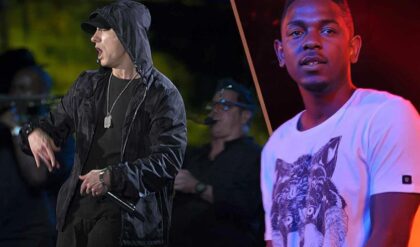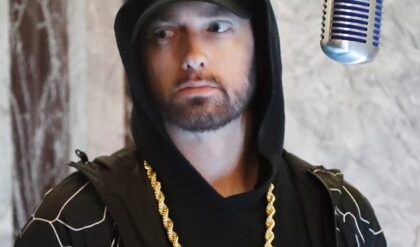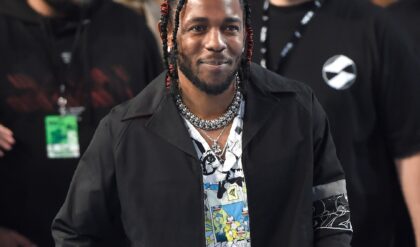[This story contains spoilers from True Detective: Night Country.]
Kali Reis and the rest of the Night Country brain trust faced a tall order as the new stewards of the True Detective franchise.
Reis, alongside showrunner Issa López and two-time Oscar-winning co-star Jodie Foster, opted to chart a new course for HBO’s well-regarded crime anthology in the wake of series creator Nic Pizzolatto’s departure after three seasons and five Emmys. On a personal level for Reis, the professional boxer turned actor still felt she had a lot to prove as a relative newcomer to the entertainment industry. Her Indie Spirit-nominated debut in 2021’s Catch the Fair One popped up on López’s radar during casting, leading to an audition that she willed into the role of Alaska State Trooper Evangeline Navarro.
Joining Foster’s local police chief character, Liz Danvers, as this season’s detective-adjacent duo, Reis knew she had big shoes to fill following the likes of the series’ previous cops played by Matthew McConaughey, Woody Harrelson, Colin Farrell, Rachel McAdams, Stephen Dorff and Mahershala Ali. So she applied the same mentality and work ethic that previously turned her into a six-time world champion boxer in two different weight classes.
“The pressure was on me to bring my A-game, and whatever that A-game was going to be, I just had to work harder. I ended up treating it like I do my boxing career,” Reis tells The Hollywood Reporter. “You don’t get to relax just because you’ve won a world title. So it was an added pressure with Jodie Foster in the room, and while it was exciting to be able to learn from her, I had to stay on my toes.”
The hard work has more than paid off, as Reis has now made history alongside Under the Bridge’s Lily Gladstone, becoming the first two Indigenous women to receive Emmy nominations for acting. Reis’ nom for best supporting actress in a limited series is not the first time she’s blazed a new trail in relation to HBO; she also participated in the network’s first-ever broadcast of a women’s boxing match in 2018.
The Rhode Island native’s Emmy nom is one out of a staggering 19 nominations for López’s six-episode season, and the recognition is meaningful for a variety of reasons, the least of which involves Pizzolatto and his loyal fans who threw a few Instagram-based jabs at Night Country’s creative decisions. (Pizzolatto has since deleted his comment replies to these fan-initiated swipes.)
“Personally, the biggest accolade is the fact that the people we represented, the Indigenous people of Alaska, were really proud to see themselves. So these Emmy nominations are just an added bonus,” Reis says. “But if I was going to be human, I’d be like, ‘All right, 19 nominations? That’s kind of a mic drop.’ So you can say what you want, but everything isn’t for everyone, and it’s an honor to have these nominations.”
Not to mention, Night Country pulled in more viewers than the previous three True Detectives with 12.7 million viewers tuning in to every episode, and earned a swift season five renewal with López returning at the helm.
Below, during a recent FYC conversation with THR, Reis details her working relationship with Foster, before offering her latest take on the fourth season’s rather cryptic final shot.
***
You were part of a new creative team that helmed a fourth season of True Detective, and the reputation of this beloved HBO series adds a ton of pressure in and of itself. On top of that, there were some well-publicized naysayers as the season aired. So, do these 19 Emmy nominations feel all the more validating given the circumstances?
Overall, it was an amazing story to be a part of and tell, especially under such a beloved entity as True Detective. Everything is not for everyone, and of course, people are going to say what they’re going to say. But, having this experience with the naysayers and now having 19 nominations, it’s not that we needed the validation; it’s just a testament to our intentions. The intention was to do the best we could to tell this great story that we loved, and so these Emmy nominations are an added bonus.
Personally, the biggest accolade is the fact that the people we represented, the Indigenous people of Alaska, were really proud to see themselves. So these Emmy nominations are again just an added bonus, but if I was going to be human, I’d be like, “All right, 19 nominations? That’s kind of a mic drop.” So you can say what you want, but everything isn’t for everyone, and it’s an honor to have these nominations.
Jodie Foster and Kali Reis in True Detective: Night Country.
Bart Simpson, in the opening credits of The Simpsons, has to rewrite the same message over and over again while in detention. You also did a non-punitive version of this behavior in the lead-up to landing the role of Evangeline Navarro?
(Laughs) Yeah, the audition process was out of my control. I gave the audition and did the best that I could, but I really wanted this role because it felt like a really good fit for me. So I wrote, “I will get the part of Evangeline Navarro in True Detective: Night Country,” over and over again. So, yes, I did Bart-Simpson it. Maybe I should patent that. (Laughs.)
As a cop character, you were following in the footsteps of Matthew McConaughey, Woody Harrelson, Rachel McAdams, Colin Farrell, Stephen Dorff and Mahershala Ali. You were also being paired with two-time Oscar winner Jodie Foster. Did that combined legacy weigh on you during filming, or were you able to tune it out?
True Detective, a big HBO series and Jodie Foster, who was the legendary cherry on top — there was a lot of pressure going into this as a newcomer. Working with an experienced writer-director in Issa López and with the legend Jodie Foster was terrifying, but I was excited to learn from them. So the pressure was on me to bring my A-game, and whatever that A-game was going to be, I just had to work harder. I ended up treating it like I do my boxing career. You don’t get to relax just because you’ve won a world title. You’ve got to work harder. So it was an added pressure with Jodie Foster in the room, and while it was exciting to be able to learn from her, I had to stay on my toes.
Reis and Foster in Night Country.
The heavy hitters like Jodie are usually aware of how their presence affects the people around them, so did she do anything to put you at ease or disarm you?
Just her as a human being is disarming enough. She’s such a lovely human being, and she treats everybody with kindness. There was no hierarchy. It wasn’t like, “I’m the teacher, you’re the student.” She lit up every room with a huge smile and she’d give me a big hug, and then we’d get right to work. She was also interested in everybody else’s process. It wasn’t like, “This is what we’re doing.” It was all collaborative, so that was pleasantly disarming. And she’s hilarious. She loves to laugh, and she’s a very hard worker, which I related to. I hate to keep comparing this to boxing, but you do all this work in [training] camp for three months, and then fight night is fight night. There’s nothing else you can do. So True Detective was kind of like that attitude. We both did the prep, we both shared our prep, and when it was time to shoot, we both did the best we could in that cold weather.
Night Country begins with Navarro and Danvers (Foster) at odds, but they gradually warm up to each other again. Did you and Jodie get closer and closer as your characters got closer and closer with each other again? Did real life bleed into the work?
Our personal relationship skyrocketed to a really close relationship very quickly, but as we learned more about our characters, we definitely developed an even deeper bond. Outside of just Danvers and Navarro, we made sure that we had Kali and Jodie time. She was so interested in my life as a boxer, and I was so interested in her life as Jodie Foster. So we definitely had a bond, and as we discovered new things about our characters, we also became closer, which was really cool as well.
Aka Niviâna and Reis in Night Country.
In the end, Navarro finally cracks Annie K’s case that’s haunted her for six years, while also solving the Tsalal case at the same time. But her sister (Aka Niviâna) ended her life in the middle of it all. Did Navarro disappear at the end in hopes of finding an inner peace that keeps eluding her?
So there are haunting questions that everybody has had: “Did she disappear? Did she follow her sister? Is she alive? Is she dead?” I believe that her sister was the tangible thing that helped hold Navarro together, and after her sister is gone, she goes all in. She has to find the answer to this case. It’s do or die. So, once she cracks it, she’s at peace in a way that she can finally close that door and not be afraid to move forward, whether she’s in this life or the next life. She had such a journey up and down, and I believe she is at peace. Whether you believe she’s followed her sister [into death] or she’s still in this 3D world, she is at peace now.
Reis and Foster in Night Country.
Yeah, the series ends on an ambiguous note as Navarro appears on Danvers’ deck, and we’re not sure whether she’s in human or spirit form. Did the script also leave it open-ended?
Yeah, it did keep it open-ended. It was very ambiguous, and I love that about the ending.
I always appreciated how Navarro’s friend and off-and-on lover, Qavvik (Joel D. Montgrand), remained patient and caring with her. Does part of you wish that things could’ve worked out differently for them?
Not at all. He’s a very important chapter in her life, but he’s perfect for the chapter that she’s in when we meet her. I think that the relationship between Navarra and Qavvik is the most adorable, self-explanatory and mysterious relationship that we have ever seen on television or in movies. He’s exactly what she needs by being very patient. She needs to be able to do what she needs to do, but she does need that support. So I don’t wish it was any different. I know that there are other people who wish there was a Navarro-Qavvik spinoff so they can see how it began and where it goes, but at this point in Navarro’s life, it was perfect. So I wouldn’t change a thing, and I don’t wish that they ended up with a picket fence.
Reis and Joel Montgrand in Night Country.
She initiates a fight with a group of guys after the death of her sister. She wants to release her pain and receive some as well. Given that you’re a professional boxer, did you notice the punch-throwing actor practicing his form and really trying to impress you?
(Laughs.) Luckily, we had plenty of stunt rehearsals, and he did ask me for tips on how to throw punches. He asked me if his form was correct. So it was a lot of fun, and that was probably one of my favorite things to do. The stunt crew was so game, especially the main guy. He was in the corner trying to shadowbox, and I was like, “Dude, I’m the professional here.” (Laughs.)
Navarro reflects on her military service in the premiere, and we’re shown a brief flashback of her talking to a fellow soldier with half their head blown clean off. Did you ever ask Issa for its meaning?
That is a very interesting sequence, and we did have a conversation about what that memory actually means for her. If you recall the conversation she was having with Annie K’s brother, Ryan, he asked, “Do you believe in God?” And the first thing she goes to is that memory, so we talked about how unexpected that moment is. You expect to see God in a church or hear God while you pray, but that was one of the first out-of-nowhere times where Navarro is like, “OK, there is something else. I’ve got to stop ignoring it.” So we had those conversations as to what that actual memory meant, but not in so many words.
Lastly, decades from now, when you’re reminiscing about the making of True Detective: Night Country, what day will you likely recall first? What day best sums up the experience?
There were so many days — 122 days. (Laughs.) During one of the colder night shoots, the wind was blowing and I could barely move my mouth, but everybody was outside together. And then we looked up to see and hear these beautiful northern lights. A hush then fell over us as we looked up at the greens, blues and pinks in the sky. So everybody took a moment to look up even though we were shooting, and I never imagined that I would be able to have that moment with such an amazing cast and crew.








